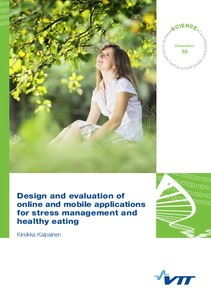Design and evaluation of online and mobile applications for stress management and healthy eating
Kaipainen, Kirsikka (2014)
Kaipainen, Kirsikka
VTT
2014
Teknis-taloudellinen tiedekunta - Faculty of Business and Technology Management
This publication is copyrighted. You may download, display and print it for Your own personal use. Commercial use is prohibited.
Julkaisun pysyvä osoite on
https://urn.fi/URN:NBN:fi:tty-201609134505
https://urn.fi/URN:NBN:fi:tty-201609134505
Tiivistelmä
Stress management and healthy eating are ongoing struggles for many people in the developed world. The consequences of chronic stress and unhealthy diets are borne at both individual and societal level. Currently, ischemic heart disease is the leading cause of death in the world, and depression is the leading cause of disability. Their early prevention calls for scalable and affordable means to provide support for healthy dietary choices and daily recovery from stress. Modern technology offers potential solutions for daily self-management but few health-promoting applications have reached widespread use despite promising research findings.
The aims of this thesis were to assess the real-world use of health-promoting online and mobile applications, to evaluate their objective and subjective benefits, and to draw design guidelines for preventive applications. Six studies on online and mobile applications for stress management and healthy eating were conducted with diverse settings and target groups. Two of the studies assessed the use of an online and a mobile application for healthy eating and found that less than 10% of the almost 200,000 users they attracted remained active. Two studies evaluated the benefits of technology tools combined with group intervention for stress management and found improved well-being and active use of tools, although human contact was appreciated most. The last two studies analysed stress management applications and suggested new design principles for them.
Based on the findings, freely available applications can reach a large number of users, but the attrition is likely to be very high and it is unclear whether the intended audience is reached. Applications can contribute to improved well-being and provide support for behavioural changes and skills learning as long as they are simple, attractive and easy to integrate into everyday life. The design of applications should support small daily actions that result in immediate benefits, emphasize self-improvement and reflection, and offer guidance while maintaining freedom of choice. The results support the feasibility and applicability of online and mobile applications for health promotion at individual level and highlight the importance of a systematic theory-driven, user-centric and business-oriented approach to intervention development. The societal impact of the applications may remain small unless real-world implementation, maintenance and dissemination are planned from the very beginning of the development process.
The aims of this thesis were to assess the real-world use of health-promoting online and mobile applications, to evaluate their objective and subjective benefits, and to draw design guidelines for preventive applications. Six studies on online and mobile applications for stress management and healthy eating were conducted with diverse settings and target groups. Two of the studies assessed the use of an online and a mobile application for healthy eating and found that less than 10% of the almost 200,000 users they attracted remained active. Two studies evaluated the benefits of technology tools combined with group intervention for stress management and found improved well-being and active use of tools, although human contact was appreciated most. The last two studies analysed stress management applications and suggested new design principles for them.
Based on the findings, freely available applications can reach a large number of users, but the attrition is likely to be very high and it is unclear whether the intended audience is reached. Applications can contribute to improved well-being and provide support for behavioural changes and skills learning as long as they are simple, attractive and easy to integrate into everyday life. The design of applications should support small daily actions that result in immediate benefits, emphasize self-improvement and reflection, and offer guidance while maintaining freedom of choice. The results support the feasibility and applicability of online and mobile applications for health promotion at individual level and highlight the importance of a systematic theory-driven, user-centric and business-oriented approach to intervention development. The societal impact of the applications may remain small unless real-world implementation, maintenance and dissemination are planned from the very beginning of the development process.
Kokoelmat
- Väitöskirjat [4769]
